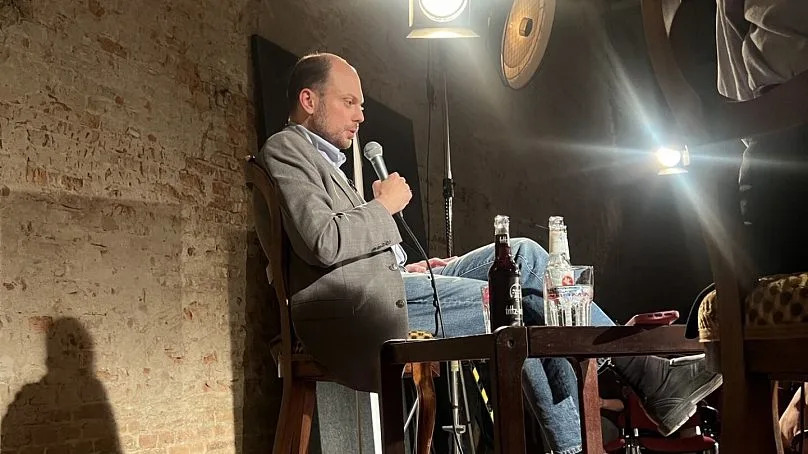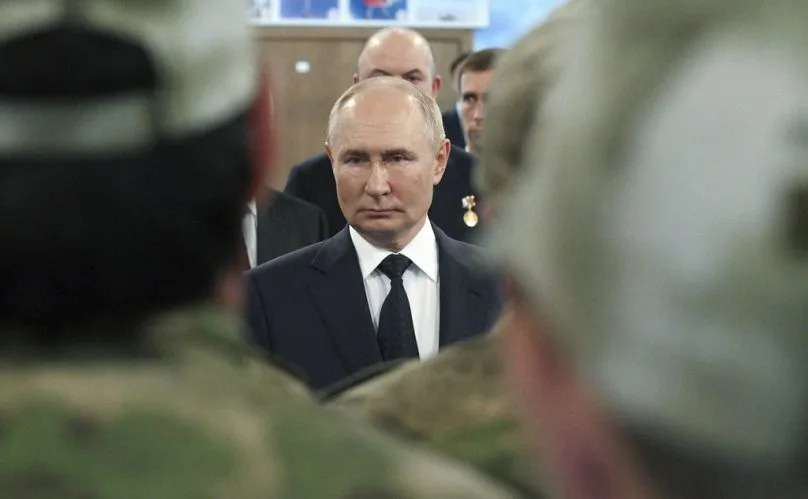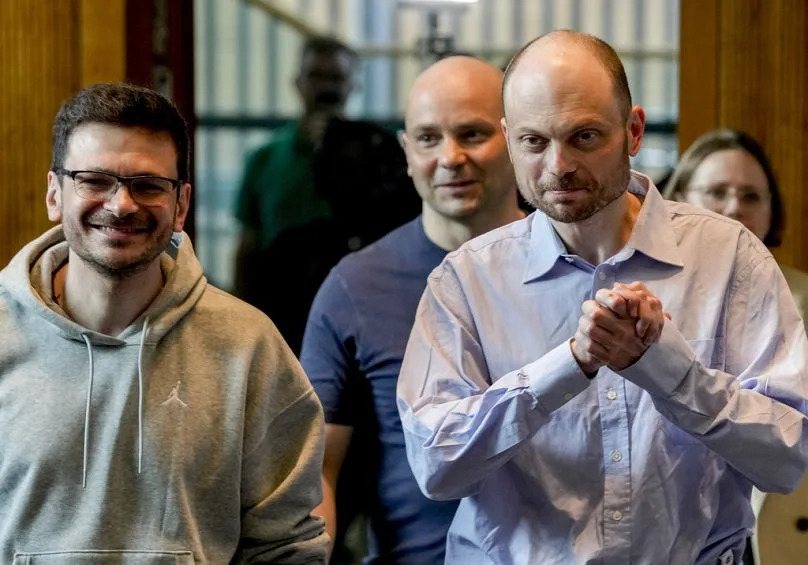
Freed Russian dissident Kara-Murza: Death would be too mild a punishment for Putin
euronews: "At first I thought they were going to shoot me, then it was like in a very good film.”
Speaking in Berlin, Russian opposition activist Vladimir Kara-Murza reflected on his release from Russian prison this summer as part of the largest prisoner exchange between Western countries and Moscow since the end of the Cold War.
In a brick building resembling a medieval castle, he told his audience of his time in prison in the Siberian city of Omsk and his plans to rebuild Russia from exile.
Kara-Murza is relatively safe now. Yet, when he left Russia, he received a warning not to tell “too much”.
“You know what can happen otherwise”, he was told. But he is now a free man, and told his supporters in the dimly lit dungeon-like hall that it all seems simply surreal.
The atmosphere around his detainment and release is reminiscent of Russia of the 1950s. During Josef Stalin's last years in power, the so-called "intelligentsia" — Russia's intellectual elite, to which Kara-Murza's ancestors also belonged — met in secret to discuss topics that were strictly forbidden and for which one could easily be sent to the gulag.
In April 2022, he was arrested and sentenced to 25 years in prison for treason and spreading false information about the Russian army. At that time, he did not believe he would ever get out alive.
“In prison, cats were my only interlocutors,” said Kara-Murza, describing his everyday life in solitary confinement, where he served most of his two-and-a-half-year prison sentence.
In the entire time he was in prison, he spoke to his wife only once and his children twice. Sitting in his tiny prison cell, he often had no choice but to stare at a blank wall.
“You can go mad”, he said. “You start to forget words.” In order not to lose his mind completely, he ordered a book from the prison's local bookshop and started learning Spanish.
Free at last
When he was suddenly escorted out of prison, Kara-Murza's first thought was that the guards were going to shoot him. But everything unfolded differently. From Tomsk, he flew directly to Moscow and from there, to Ankara.
He did not realise he was part of a prisoner exchange until he and other prisoners were brought to the buses that would take them to a Moscow airport.
There, he met familiar faces, among them the Russian opposition politician Ilya Yashin, who was also freed from incarceration. “You look like crap,” Yashin told him as they met again for the first time in two and a half years.
(Yashin was in the front row among the spectators in Berlin, smiling as Kara-Murza told the story.)
Vladimir Kara-Murza speaks in Berlin. - Euronews
When he arrived in Ankara, a woman passed Kara-Murza a phone. On the other end was US President Joe Biden.
“When I was in solitary confinement, I hardly had any contact with people. I hardly had spoken a word in Russian for two and a half years, let alone in English”, Kara-Murza laughed.
When he heard the voices of his wife and children again for the first time in a long while, he was utterly overwhelmed. Something completely unbelievable was happening.
Old mistakes
Kara-Murza was recently welcomed to Germany by Chancellor Olaf Scholz. The two men talked about the future of Russia and the thousands of political prisoners who are still behind bars in Russia and Belarus, serving their prison sentences under the harshest conditions — and about Russian civil society, which Kara-Murza wants to help build up from exile.
He wants to give voice to those Russians who “do not want to live in an archaic, isolated authoritarian pseudo-empire, but in a civilised European state”.
“The only thing needed for the triumph of evil is for good people to do nothing, Alexei Navalny always liked to say,” Kara-Murza recalled. “I stand behind every word. Every totalitarian system only exists with the support of the ordinary people.”
But how did Russia end up becoming the restrictive country it is today?
Vladimir Putin. - Alexei Danichev/Sputnik
According to Kara-Murza, this is due to two mistakes made in the 1990s. One mistake came from within the country, and one from the outside. Russia's mistake, he says, was a failure to come to terms with its past.
“If the evil is not condemned and punished, it will return," Kara-Murza explained. "All the countries that have successfully mastered the path from totalitarianism underwent a moral catharsis. Germany was forced to do so after 1945. Later, people were allowed to look into archives and deal with the issue."
"This never happened in Russia."
The other mistake, he said, was made in the West. Other Eastern European countries had a much easier time recovering from their Soviet past and forming democracies because they received a powerful stimulus from the outside. They received the opportunity to become a part of Europe again. But in the 1990s, the West was not yet ready to accept and integrate a democratic Russia.
“Of course, Russia must learn its lessons. But it is just as important that the West is ready to accept a new, democratic Russia that has learnt from its mistakes. Russia inseparably belongs to Europe. Both culturally and mentally.
"If our goal is a peaceful, free and united Europe, then this is only possible with the participation of a peaceful and free Russia."
'Death would be too lenient a punishment'
Russia is a multi-ethnic country, but it has yet to become “a truly federal state”, Kara-Murza emphasized. Many Russians fear that Russia could fall apart like the Soviet Union did and therefore support an authoritarian leadership.
“I don't think there will be such a fragmentation,” Kara-Murza said. To him, it seems more likely that there will be stronger regulation mechanisms and laws that will protect the identity of ethnic minorities in the country.
What the individual regions should be allowed to do, he says, is to speak their native language and teach it to their children in schools.
“Russia is now pursuing a centralised policy. This is wrong."
Freed Russian prisoners Ilya Yashin, Andrei Pivovarov and Vladimir Kara-Murza at a press conference in Bonn, Germany. - Michael Probst/Copyright 2024 The AP. All rights reserved
To achieve this and other freedoms within Russia, Vladimir Putin would need to relinquish his power.
“Maybe Russia will be free when he finally dies," someone from the audience remarks. However, Kara-Murza wants Putin to be healthy.
“I want to see him in the dock. I want him to take responsibility for everything he has done in 25 years.
"I know that he will answer for his sins." said Kara-Murza, pointing his index finger upwards, "but I want him to be held accountable here too. He must take responsibility for Nemtsov, for Navalny, for the Ukrainian children who were killed. Death would be too lenient a punishment.”
Truth and hope
According to Kara-Murza, everyone can contribute to a free Russia. “There is enough work for all of us,” Kara-Murza promised.
“It is important to maintain dialogue, to talk to people and to convince them, so that later, when Russia is ready to change, everything that has been destroyed in the last 25 years can be restored,” he said. “We cannot allow ourselves to lose the connection to our beloved Russia — the Russia of Boris Nemtsov and Alexei Navalny”.
Meanwhile, Kara-Murza dreams of visiting the city of Tomsk, where he spent such a long time in prison.
“It's a strange dream”, he admitted. He has been to many Siberian cities but had never seen Tomsk outside his tiny prison cell, where he received thousands of letters every month.
“In their letters, people always asked me why I was so optimistic, why I had hope. I always replied that I don't hope, I know. The truth is on our side.”















1 comment
RD
2024-09-12
Хотеть и мочь сделать, это очень разные вещи, Владимир. Я тоже бы хотел видеть его на скамье подсудимых, но более всего я хотел бы видеть его убитым, но хотеть и мочь это сделать, это очень разные вещи. Горе всему нашему народу.